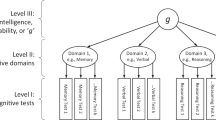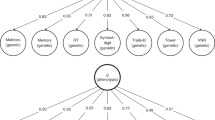Abstract
Eaves and Jinks1 have failed to note the significance of Scarr-Salapatek's2 data, which provides important evidence against the heritability of IQ performance. A straightforward overall evaluation of this study, together with a review of evidence3–7 which Eaves and Jinks consider to be more secure in establishing a genetical component to IQ performance shows that: (1) the upper limit of IQ heritability in Scarr-Salapatek's study is 15%±6%. This is consistent with zero heritability and directly contradicts the higher figures claimed by other studies3–7; (2) other studies5–7 which use identical-fraternal comparisons to derive apparently higher upper limits to heritability do not take into account the more similar treatment frequently given to identical twins. When this is adjusted for, these studies are consistent with low or zero heritability; (3) the similarity between separated identical twins, used by Jinks and Fulker3 to derive an 80% heritability estimate, can be quantitatively accounted for by highly correlated placement (ref. 8 and L. J. Kamin, Invited Address, Eastern Psychological Association, Washington DC, March 1973) with little or no genetical component.
This is a preview of subscription content, access via your institution
Access options
Subscribe to this journal
Receive 51 print issues and online access
$199.00 per year
only $3.90 per issue
Buy this article
- Purchase on Springer Link
- Instant access to full article PDF
Prices may be subject to local taxes which are calculated during checkout
Similar content being viewed by others
References
Eaves, J. J., and Jinks, J. L., Nature, 240, 84 (1972).
Scarr-Salapatek, S., Science, N.Y., 174, 1285 (1971).
Jinks, J. L., and Fulker, D. W., Psych Bull., 73, 311 (1970).
Burt, C., Br J. Psychol., 57, 137 (1966).
Jensen, A. R., Harv. educ. Rev., 39, 1 (1969).
Jensen, A. R., Proc. natn. Acad. Sci. U.S.A., 58, 149 (1967).
Erlenmeyer-Kimmling, L., and Jarvik, L. F., Science, N.Y., 142, 1477 (1963).
Fehr, F. S., Harv. Educ. Rev., 39, 57, (1969).
Snedecor, G. W., and Cochran, W. G., Statistical Methods, 295, (Iowa State,1967).
Herrnstein, R., Atlant. Mon., 228, 43 (1971).
Scarr-Salapatek, S., Science, N.Y., 178, 236 (1972).
Vandenberg, S. G., in Genetics (edit. by Glass, D. C.), 3 (Rockefeller University Press, New York, 1968).
Huntley, R. M. C., in Genetic and Environmental Factors in Human Ability (edit. by Meade, J. E., and Parkes, A. S.), 208 (Plenum, New York, 1966).
Klineberg, O., Negro Intelligence and Selective Migration (Columbia University Press, New York, 1935).
Author information
Authors and Affiliations
Rights and permissions
About this article
Cite this article
SCHWARTZ, M., SCHWARTZ, J. Evidence Against a Genetical Component to Performance on IQ Tests. Nature 248, 84–85 (1974). https://doi.org/10.1038/248084a0
Received:
Revised:
Published:
Issue Date:
DOI: https://doi.org/10.1038/248084a0
This article is cited by
-
Inbreeding depression and intelligence quotient among north Indian children
Behavior Genetics (1993)
-
Evidence for a low upper limit of heritability of mental test performance in a national sample of twins
Nature (1976)
-
No evidence for heritability of social attitudes
Nature (1975)
-
Some myths about heritability and IQ
Nature (1974)
Comments
By submitting a comment you agree to abide by our Terms and Community Guidelines. If you find something abusive or that does not comply with our terms or guidelines please flag it as inappropriate.



